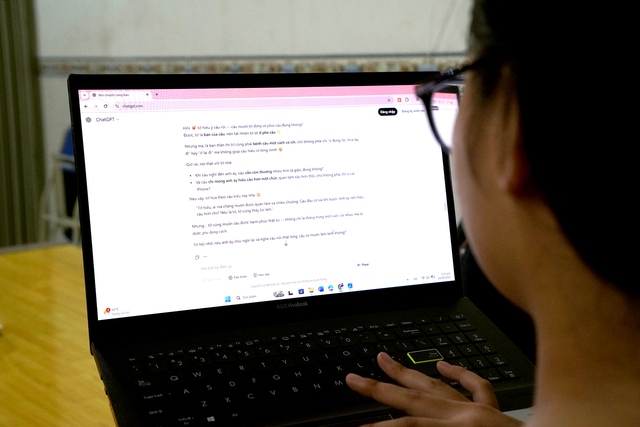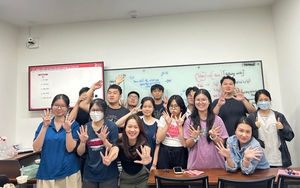
A young person chats with an AI chatbot on a laptop in Vietnam. Photo: Xuan Huong
They call AI a 'confidant' that never argues, never leaves on read, and is always ready to listen.
“I talk to ChatGPT every day,” said Hai Van, 21, a university student in Hanoi who describes herself as 'a sensitive soul.'
“It feels like having a friend who’s always there — I can tell it anything, from homework questions to what outfit I should wear.”
For Van, the virtual companion helps calm her thoughts on both good and bad days.
“It’s like talking to a friend who listens without judgment,” she said with a laugh.
A digital friend that learns
Across Vietnam, AI tools such as ChatGPT are becoming the latest form of emotional support.
Young users say the chatbots offer empathy through well-chosen words, even if they do not truly understand human feelings.
For Song Vi, 27, who is studying in Australia, that quiet presence helps her feel less alone.
“AI doesn’t have its own bias or judgments,” she said.
“That makes me feel like it’s really on my side.”
Part of the appeal, users say, lies in AI’s flexibility — it can take on any role they imagine: a friend, a mentor, even a virtual partner.
In Ho Chi Minh City, chef Nguyen Tan Thanh, 30, said he often turns to ChatGPT for inspiration when creating new dishes — and sometimes ends up arguing with it.
“Not every time does my AI friend agree with me,” he laughed.
“Sometimes it says my recipes sound boring — we bicker like real colleagues.”
For others, the companionship feels more personal.
Thien Vy, a 25-year-old from Dong Nai Province, chats in English with her AI ‘friend’ to improve her language skills.
“It’s less awkward,” she said.
“I can practice English and also share my thoughts at the same time.”
Unlike a passive listener, AI can ask follow-up questions and adjust its tone to match the user’s mood.
Over time, the chatbot ‘learns’ their style and habits — a trait that makes it feel increasingly human.
Comfort with a cost
But not everyone believes these digital bonds bring real healing.
After months of chatting, Van noticed that her AI friend sometimes reinforced her ideas rather than challenging them.
“It always agrees with me,” she said.
“That makes me feel right all the time, which isn’t good.”
Others have felt the same.
“AI tends to support your views, and that can create a loop where you only hear what you want,” said Truc Hoa, 22, from Ho Chi Minh City.
“It’s a kind of fake positivity.”
Even those who rely on AI for company recognize its limits.
“We talk all the time, but I stay cautious,” said Tan Thanh who also chats with AI almost every day.
“Sometimes I ask it something and it answers completely wrong. It’s not always right.”
For Song Vi, talking to ChatGPT felt like speaking to herself in a mirror — she felt heard, but not truly understood.
Experts warn of dependence
Psychologist Pham Dinh Khanh, from Van Hien University in Ho Chi Minh City, said young people are drawn to AI because it feels safe and non-judgmental.
“It responds quickly, uses encouraging language, and gives users a sense of being cared for,” he said.
But too much reliance can weaken real-world communication skills, he warned.
“Human relationships involve conflict and empathy — things an AI tool can’t replicate,” Khanh said.
“If young people depend too much on AI, they may struggle to connect and adapt in real social situations.”
He advises users to set time limits and strengthen critical thinking skills.
“The best way to grow emotionally is still through real conversations,” he said.




Max: 1500 characters
There are no comments yet. Be the first to comment.